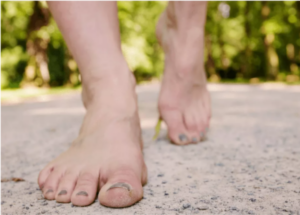Foot odor is a common problem that many people face, often causing discomfort and embarrassment. While there are numerous remedies and products available to tackle this issue, pumice stone foot scrubbers stand out as a natural and effective solution. This article will explore how pumice stone foot scrubbers address foot odor, delving into the underlying causes of the odor, and how the properties and usage of pumice stones can alleviate this condition.
Firstly, we will examine the causes of foot odor, which primarily stems from the interaction between sweat and bacteria on the skin’s surface. Understanding this will set the foundation for appreciating the efficacy of pumice stones. Next, we will discuss the physical and chemical properties of pumice stone that make it suitable for foot care. Following that, we will delve into the mechanical exfoliation process, explaining how pumice stones remove dead skin cells and thereby reduce the bacterial load on the feet.
Additionally, we will consider any antimicrobial effects of pumice that contribute to its odor-combating properties. Finally, to ensure prolonged effectiveness and hygiene, the maintenance and care of pumice stone foot scrubbers will be covered, providing tips on how to keep them clean and functional. Through these subtopics, the article will provide a comprehensive overview of how pumice stone foot scrubbers can be a key tool in managing and eliminating foot odor.
Causes of Foot Odor
Foot odor is a common problem that many people experience, and it can be both embarrassing and uncomfortable. The primary cause of foot odor is the sweat produced by the feet combined with the bacteria that naturally live on the skin. Human feet have a high concentration of sweat glands, approximately 250,000 in each foot, which produce sweat to help regulate body temperature and moisturize the skin.
However, when this sweat accumulates, especially in a warm and moist environment like the inside of a shoe, it provides a perfect breeding ground for bacteria. The bacteria break down the sweat and in the process, produce isovaleric acid, which is responsible for the characteristic stinky feet smell. Factors such as poor hygiene, wearing the same shoes repeatedly without allowing them to dry, and synthetic materials that do not breathe well can exacerbate foot odor.
Moreover, hormonal changes, stress, and certain medications can increase the amount of sweat the body produces, thereby potentially increasing foot odor. Addressing foot odor effectively often requires a combination of good hygiene practices, choosing the right footwear, and using products designed to control sweat and eliminate bacteria, such as pumice stone foot scrubbers. These tools not only help in physically removing dead skin cells but may also aid in reducing the conditions that favor bacterial growth.
Properties of Pumice Stone
Pumice stone, due to its unique properties, is commonly used in foot care, particularly in removing dead skin and reducing foot odor. This naturally occurring volcanic rock is formed when lava rich in gas and water is ejected from a volcano. The rapid cooling and depressurization of the lava results in a highly porous and abrasive stone that is lightweight and rough.
The primary characteristic that makes pumice stone effective for foot care is its abrasive nature. This rough texture helps in physically scrubbing off the dead skin cells from the feet. Removing this layer of dead skin not only smooths and softens the feet but also plays a crucial role in controlling foot odor. Dead skin cells can harbor bacteria, which are a significant contributor to bad foot odor. By exfoliating these cells away, pumice stones reduce the bacteria’s habitat, thus decreasing the odor.
Moreover, the porosity of pumice stones allows them to absorb moisture and oils, which are often excessive on feet and can contribute to odor development. By keeping the feet drier and cleaner, pumice stones help in minimizing the conditions that lead to foot odor. Regular use of a pumice stone is a straightforward and natural method to maintain foot hygiene and prevent the accumulation of odor-causing elements. This makes pumice stones an essential tool in foot care routines for individuals looking to manage foot odor effectively.
Mechanical Exfoliation Process
The mechanical exfoliation process plays a crucial role in the management of foot odor when using pumice stone foot scrubbers. This process involves physically scrubbing the feet with a pumice stone to remove dead skin cells. Dead skin cells can accumulate on the feet and contribute to foot odor by providing a breeding ground for bacteria. These bacteria break down the dead skin cells, releasing foul-smelling compounds as a byproduct.
The abrasive nature of pumice stone makes it an excellent tool for exfoliation. Pumice is a type of volcanic rock that is both porous and abrasive, making it ideal for sloughing off dead skin and calluses from the feet. By removing these layers, pumice stones help to reduce the amount of bacteria on the skin’s surface, thereby decreasing the odor.
Moreover, the process of exfoliation improves the overall health of the feet by stimulating blood flow and promoting the growth of new, healthy skin cells. Regular use of a pumice stone can leave the feet smoother and fresher, reducing the likelihood of odor-causing bacteria accumulating. It is important, however, to use the pumice stone gently to avoid damaging the skin, which could potentially worsen foot health and odor issues.
Antimicrobial Effects of Pumice
Pumice stone, commonly used for exfoliating skin, also possesses antimicrobial properties that can help in dealing with foot odor. Foot odor is primarily caused by bacteria and fungi thriving on the skin and in the moist environment of shoes. The rough texture of pumice stone not only aids in removing dead skin cells but also reduces the habitat these microorganisms need to grow.
The antimicrobial effects of pumice are attributed to its porous nature. When used to scrub the feet, pumice helps to unclog pores and remove the buildup of dead skin and sweat, which are breeding grounds for bacteria. By minimizing the amount of bacteria and fungi on the skin’s surface, the overall amount of odor can be significantly reduced.
Moreover, regular use of a pumice stone improves the breathability of the skin. Enhanced skin breathability prevents excessive sweating – another key factor contributing to foot odor. It’s important, however, to maintain the pumice stone properly to preserve its antimicrobial properties. Keeping the pumice stone dry between uses prevents bacteria from colonizing on the stone itself.
In conclusion, while pumice stones are widely recognized for their ability to smooth and soften the skin, their role in reducing foot odor through antimicrobial activity is equally valuable. Integrating the use of a pumice stone into regular foot care routines can be an effective method to maintain foot hygiene and manage odor.
Maintenance and Care of Pumice Stone Foot Scrubbers
Pumice stone foot scrubbers are essential tools for maintaining smooth, healthy feet by removing dead skin and calluses. To ensure that they remain effective and hygienic, proper maintenance and care are crucial.
Pumice stones are porous, making them ideal for exfoliating the skin, but this also means they can harbor bacteria if not cleaned properly. After each use, it is important to rinse the pumice stone thoroughly under running water to remove skin debris and any bacteria. Every few weeks, it’s beneficial to boil the pumice stone in water for about five minutes to disinfect it completely. Alternatively, soaking the stone in a solution of equal parts water and vinegar for a few hours can also help to sanitize it and remove any lingering odors.
Drying the pumice stone completely after washing is another key step in its care. This can be done by placing it in a well-ventilated area or directly under sunlight. Proper drying prevents the growth of mold and mildew. Storing the pumice stone in a dry place ensures that it remains safe to use for your next pedicure session.
Maintaining your pumice stone not only extends its lifespan but also enhances its effectiveness in foot care routines. Regular care keeps the stone rough and ready to tackle tough skin, providing you with smoother, fresher feet after every use.




